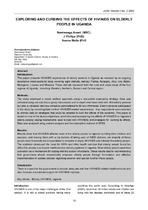Exploring and curbing the effects of HIV/AIDS on elderly people in Uganda

View/
Date
2009Author
Nankwanga, Annet
Phillips, Julie
Neema, Stella
Metadata
Show full item recordAbstract
Introduction: This paper presents HIV/AIDS experiences of elderly persons in Uganda as revealed by an ongoing descriptive cross-sectional study covering eight districts, namely: Pallisa, Kampala, Jinja, Lira, Nebbi, Ntungamo, Luwero and Mbarara. These districts represent both the rural and urban areas of the four regions of Uganda, including: Western, Northern, Eastern and Central region. Methods: The study employed a mixed method approach using a sequential exploratory strategy. Data was collected using not only focus group discussions and in-depth interviews held with 165 elderly persons but also a validated interview schedule administered to 50 key informants. Elderly persons participated in the study by providing data on their HIV/AIDS-related experiences. Key respondents were selected to provide data on strategies that could be adopted to curb the effects of the epidemic. This paper is based on one of the study's objectives, which focussed on exploring the effects of HIV/AIDS on Uganda's elderly people; coping mechanisms used to deal with HIV/AIDS; and strategies for curbing its effects. Data was analysed using content analysis and the descriptive method of SPSS. Results: Results show that HIV/AIDS affected most of the elderly people in Uganda by killing their children and spouses, and leaving them with a big burden of taking care of AIDS orphans; yet majority of these people were financially too incapacitated to shoulder it amply. HIV/AIDS also infected the elderly people. The epidemic introduced the need for ARVs and other health services that elderly people found too difficult to access due to poor health service delivery systems in Uganda. Most elderly people used food cultivation as a mechanism for coping with the burden of orphans. These results lead to recommending that government should economically empower elderly people through formulation and effective implementation of welfare policies regarding pension and special fund for these people. Conclusion: There is a need for the government to provide adequate and free HIV/AIDS-related health services and also increase educational support for HIV/AIDS orphans.
